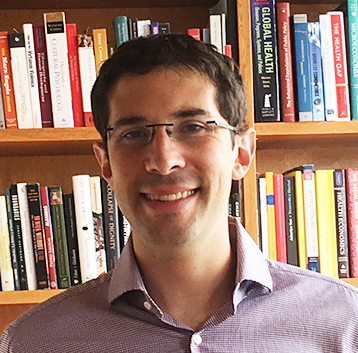New Health Economics Faculty Joins the Department of International Health, Will Focus on the Economics of Non-Communicable Diseases

Andres Vecino, MD, PhD ’16, was recently appointed an assistant scientist in the Department of International Health at the Johns Hopkins Bloomberg School of Public Health. A health economics faculty in the Department’s Health Systems Program and a researcher with the Johns Hopkins International Injury Research Unit (JH-IIRU), Vecino’s overall research interests focus on the economics of non-communicable disease and injury (NCDI) prevention. His research also investigates how to use evidence to inform and influence NCDI prevention policies.
Vecino leads several studies in Latin America for the Bloomberg Initiative for Global Road Safety project, where he coordinates the monitoring and evaluation and data collection work of local collaborators in Bogota, Fortaleza and Sao Paulo, and manages observational data collected by the project. He is also investigating the use of fiscal measures, such as taxes on tobacco, alcohol and sweetened-beverages, to protect health and prevent access to NCD risk factors.
One of Vecino’s primary research goals is to provide clear evidence on the effectiveness of road safety and NCD prevention measures to policy decision-makers. As part of this goal, Vecino aims to translate evidence into actionable polices that reduce mortality and morbidity in low- and middle-income countries. For example, a recent study of his modelled how overweight and obesity prevalence would be reduced if a sugar-sweetened-beverage tax were to be introduced in Colombia.
Vecino is lead author on a study estimating the potential number of lives saved by effective injury- prevention interventions among the poorest billion. The study identified 11 interventions that are key to reducing deaths from road traffic injuries and drowning. The findings serve as a guide for national decision-makers to prioritize policy interventions, particularly those that can protect vulnerable populations.
In addition to his NCDI prevention work, Vecino is part of the Bloomberg Philanthropies Data for Health Initiative (D4HI) Johns Hopkins team. The D4HI project works to improve public health data so that governments are equipped with the tools and systems to collect and use data to prioritize health challenges. Vecino aids in assessing the cost of mobile health innovations to collect key NCD data in Colombia.
In the fourth term of this academic year, Vecino will teach the course Globalization and Health: A Framework for Analysis as part of the new MHS in Global Health Economics degree program. “Dr. Vecino’s research will help to reduce the economic burden of chronic conditions and injuries around the world. His unique perspective expands our curriculum in key topics related to globalization, health and economics,” says Antonio Trujillo, PhD, an associate professor in the Department and director of the Global Health Economics degree program.
Vecino was also recently elected to the Board of Directors of Health Systems Global, the first international membership organization fully dedicated to promoting health systems research and knowledge translation. For more information, visit Vecino’s faculty profile.
